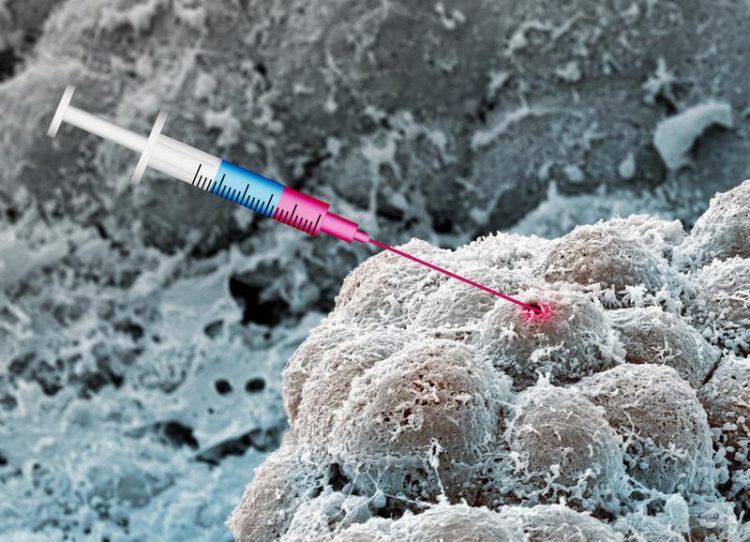Treating cancer with drugs for diabetes and hypertension

Illustration demonstrating the anti-cancer effect of the drug combination Evi Bieler, NanoImaging Lab, University of Basel
Metformin is the most widely prescribed drug for the treatment of type 2 diabetes. Besides its blood sugar lowering effect, it also displays anti-cancer properties. The usual therapeutic dose, however, is too low to effectively fight cancer.
The research team led by Prof. Michael Hall, at the Biozentrum of the University of Basel, has now made an unexpected discovery: The antihypertensive drug syrosingopine potentiates the anti-cancer efficacy of metformin. Apparently, this drug combination drives cancer cells to programmed “suicide”.
Drug cocktail kills tumor cells
At higher doses, the antidiabetic drug inhibits the growth of cancer cells but could also induce unwanted side effects. Therefore, the researchers screened over a thousand drugs for whether they can enhance the anticancer action of metformin. A favorite emerged from this screening: Syrosingopine, an antihypertensive drug. As the study shows, the cocktail of these two drugs is effective in a wide range of cancers.
“For example, in samples from leukemia patients, we demonstrated that almost all tumor cells were killed by this cocktail and at doses that are actually not toxic to normal cells”, says the first author, Don Benjamin. “And the effect was exclusively confined to cancer cells, as the blood cells from healthy donors were insensitive to the treatment.”
Drugs block “juice” supply to cancer cells
In mice with malignant liver cancer, enlargement of the liver was reduced after the therapy. Also the number of tumor nodules was less – in some animals the tumors disappeared completely. A glance at the molecular processes in the tumor cells explains the drug combination’s efficacy: Metformin lowers not only the blood glucose level, but also blocks the respiratory chain in the energy factories of the cell, the mitochondria. The antihypertensive drug syrosingopine inhibits, among other things, the degradation of sugars.
Thus, the drugs interrupt the vital processes which provide energy for the cell. Due to their increased metabolic activity and rapid growth, cancer cells have a particularly high energy consumption, which makes them extremely vulnerable when the energy supply is reduced.
Groundbreaking step towards clinical application
By testing a range of other compounds with the same mode of action, the scientists could demonstrate that the inhibition of the respiratory chain in the mitochondria is a key mechanism. These also reduced cancer cell growth in combination with the antihypertensive drug.
“We have been able to show that the two known drugs lead to more profound effects on cancer cell proliferation than each drug alone,” explains Benjamin. “The data from this study support the development of combination approaches for the treatment of cancer patients.” This study may have implications for future clinical application of combination scenarios targeting the energy needs of tumor cells.
Original source
Don Benjamin, Marco Colombi, Sravanth K. Hindupur, Charles Betz, Heidi A. Lane, Mahmoud Y. M. El-Shemerly, Min Lu, Luca Quagliata, Luigi Terracciano, Suzette Moes, Timothy Sharpe, Aleksandra Wodnar-Filipowicz, Christoph Moroni, Michael N. Hall.
Syrosingopine sensitizes cancer cells to killing by Metformin
Science Advances, published online 23 December 2016 | DOI: 10.1126/sciadv.1601756
Further Information
Prof. Michael Hall, Biozentrum, University of Basel, phone +41 61 207 21 50, E-Mail: m.hall@unibas.ch
Dr. Don Benjamin, Biozentrum, University of Basel, phone +41 61 207 21 70, E-Mail: don.benjamin@unibas.ch
https://www.unibas.ch/en/News-Events/News/Uni-Research/Treating-cancer-with-drug…
Media Contact
All latest news from the category: Health and Medicine
This subject area encompasses research and studies in the field of human medicine.
Among the wide-ranging list of topics covered here are anesthesiology, anatomy, surgery, human genetics, hygiene and environmental medicine, internal medicine, neurology, pharmacology, physiology, urology and dental medicine.
Newest articles

Properties of new materials for microchips
… can now be measured well. Reseachers of Delft University of Technology demonstrated measuring performance properties of ultrathin silicon membranes. Making ever smaller and more powerful chips requires new ultrathin…

Floating solar’s potential
… to support sustainable development by addressing climate, water, and energy goals holistically. A new study published this week in Nature Energy raises the potential for floating solar photovoltaics (FPV)…

Skyrmions move at record speeds
… a step towards the computing of the future. An international research team led by scientists from the CNRS1 has discovered that the magnetic nanobubbles2 known as skyrmions can be…





















